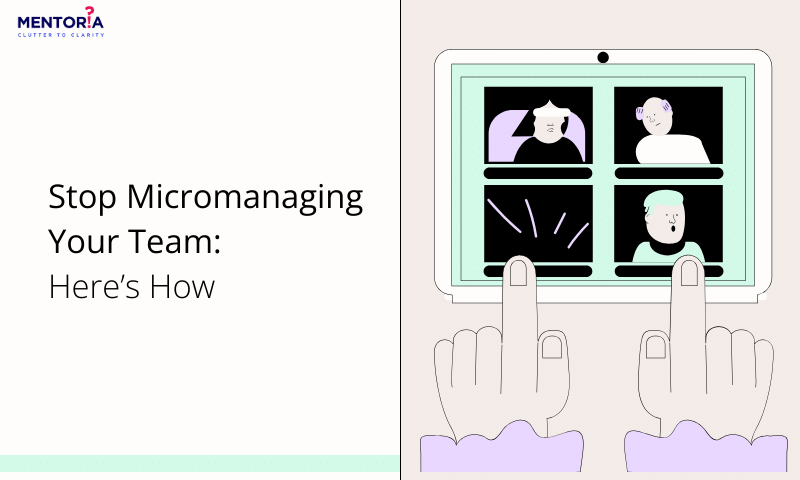Stop Micromanaging Your Team: Here’s How

Developing a team’s growth while promoting a sense of responsibility and ownership requires effective leadership, which requires striking a fine balance between direction and liberty. However, leaders can unintentionally stray into micromanagement terrain in their quest for perfection and productivity, which stifles innovation, undermines trust, and impedes advancement. It’s crucial to identify and address accidental micromanagement tendencies if you want to establish a workplace where people flourish, creativity soars, and team achievement is rewarded.
In this blog, let’s examine the negative impacts of micromanagement on a team and go over critical tactics that leaders can use to give up needless control, build trust, and promote a collaborative, empowered workplace. Leaders can guide their teams toward increased productivity, work happiness, and overall success by being aware of the negative effects of micromanagement and implementing good leadership techniques. Let’s examine useful and insightful strategies to do away with unintentional micromanagement and adopt a leadership stance that fosters team potential and accomplishment.
Consider Your Leadership Style
Start by considering your own management style. Think about whether you tend to tightly monitor every part of your team’s work or whether you give them enough autonomy and have faith in their talents. Learn about the negative effects of micromanagement on your team, including diminished motivation, stifled innovation, reduced job satisfaction, and impeded growth and development. Clearly state what you expect in terms of roles, responsibilities, and results. The requirement for ongoing supervision is reduced by effective communication.
Delegate Responsibility
Assign duties and responsibilities appropriately to enable team members to take responsibility for their job. Have faith in your staff to complete tasks without needless interference. Show your staff that you have faith in their judgement and skills to increase trust. Encourage team members to communicate their thoughts and worries in an open dialogue. Change your attention from observing each stage of the procedure to assessing the results. Put an emphasis on attaining goals, and give team members the opportunity to choose how to do it.
Offer Timely and Constructive Comments
Give your staff timely and constructive comments to help them perform better. A sense of being micromanaged may result from overly critical or controlling input, so stay away from it.
Ensure that your staff has the resources, equipment, and instruction needed to do their responsibilities successfully. Being encouraging shows that you have faith in their skills. Encourage cooperation and collaboration, fostering an atmosphere where employees can solicit advice and guidance from one another. Innovation and problem-solving are frequently improved by collaboration. To track progress, set project milestones and conduct regular cheque-ins. This offers a methodical way to manage without frequent interruption.
Develop Patience
Be patient and let team members make mistakes so they can learn from them. A hasty intervention could impede their development and self-confidence. Keeping Involvement and Respect for Autonomy in Balance; strike the correct balance between contributing to the team’s work and retaining their independence. Recognise when you should become involved and when you should back off.
Promote Professional Development: Support opportunities for training, workshops, and skill development to promote lifelong learning and development. To increase the skills and assurance of your employees, make an investment in their professional development.
Request Feedback from Your Team: Request feedback from your team on a regular basis regarding your leadership style and activities. Utilise their suggestions to modify and enhance your strategy. Encourage a culture where team members may communicate their ideas without worrying about negative consequences. Reiterate that input is important and will be used to enhance the performance of the team. What areas of your leadership style or team dynamics you want feedback on should be stated clearly. For instance, you can enquire about project management, decision-making procedures, or communication. Specificity guarantees targeted and useful input.
A critical step in the journey toward successful leadership is getting over unintentional micromanagement. Even while it is frequently unintended, micromanagement can stifle innovation, undermine trust, and prevent team advancement. Leaders may create a workplace that is more productive, engaged, and harmonious by considering their own leadership style, realising the negative effects of micromanagement, and implementing tactics that encourage trust and autonomy.
Empowering people to succeed while building a collaborative environment where ideas thrive and contributions are recognised is the art of leadership. Leaders may foster a culture where each team member feels empowered and appreciated for their distinctive contributions through clear communication, constructive criticism, efficient delegating, and a supportive ethos. Leaders can free themselves from the constraints of unintended micromanagement by adopting a results-oriented strategy, providing assistance when necessary, and exhibiting unflinching faith in their team’s talents. These purposeful actions allow leaders to bring out the full potential of their team, creating a vibrant, motivated, and high-achieving group that drives the company toward long-term success and innovation.
Boosting Morale With Mentoria
Mentoria can help you to avoid unintentional micromanagement by providing you with the tools and resources you need to become a more effective leader. For example, Mentoria’s psychometric assessment can help you to better understand your own management style and to identify any areas where you may be micromanaging your team. Mentoria’s career counsellors can also provide you with specific advice on how to delegate tasks more effectively and to give your team members the autonomy they need to be successful.









